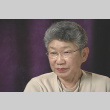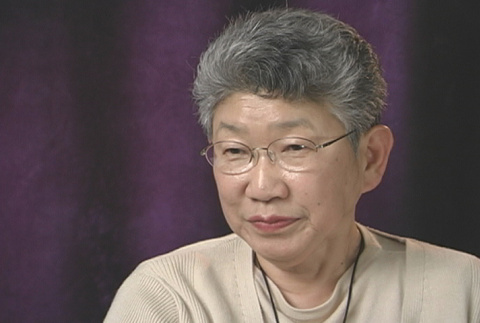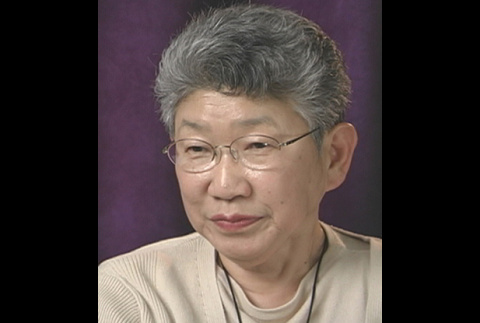69 items
69 items

vh
Betty Morita Shibayama Interview Segment 30 (ddr-densho-1000-152-30)
Living in Chicago, Illinois, postwar: ethnic composition of high school

vh
Betty Morita Shibayama Interview Segment 29 (ddr-densho-1000-152-29)
Parents find work in Chicago after the war

vh
Betty Morita Shibayama Interview Segment 7 (ddr-densho-1000-152-7)
Attending Methodist church as a child in order to become more "Americanized"

vh
Betty Morita Shibayama Interview Segment 28 (ddr-densho-1000-152-28)
Leaving camp for Chicago and attending school there: "I just felt comfortable"

vh
Betty Morita Shibayama Interview Segment 42 (ddr-densho-1000-152-42)
Taking a trip to Japan in 1984, meeting relatives

vh
Betty Morita Shibayama Interview Segment 3 (ddr-densho-1000-152-3)
Description of photographs of parents and grandparents

vh
Betty Morita Shibayama Interview Segment 23 (ddr-densho-1000-152-23)
Attending grammar school in Minidoka; memories of a teacher who nearly used the term "Jap"

vh
Betty Morita Shibayama Interview Segment 12 (ddr-densho-1000-152-12)
Memories of prewar Japanese community activities: mochitsuki and picnics

vh
Betty Morita Shibayama Interview Segment 15 (ddr-densho-1000-152-15)
Some positive memories of supportive Caucasian neighbors in the time leading up to mass removal

vh
Betty Morita Shibayama Interview Segment 39 (ddr-densho-1000-152-39)
Husband is denied redress as a Japanese Peruvian and begins to speak at public venues

vh
Betty Morita Shibayama Interview Segment 40 (ddr-densho-1000-152-40)
Decision to not accept the Japanese Peruvians' settlement, and, with others, sue the government for redress

vh
Betty Morita Shibayama Interview Segment 43 (ddr-densho-1000-152-43)
Experiences lobbying congresspeople in Washington, D.C. on behalf of fight for Japanese Peruvian redress

vh
Betty Morita Shibayama Interview Segment 32 (ddr-densho-1000-152-32)
Getting engaged to a Japanese Peruvian who was not a U.S. citizen

vh
Betty Morita Shibayama Interview Segment 25 (ddr-densho-1000-152-25)
Memories of the funeral service of a family friend who was killed while serving in the U.S. Military Intelligence Service

vh
Betty Morita Shibayama Interview Segment 6 (ddr-densho-1000-152-6)
Early memories of growing up in the Hood River valley: ethnic composition of friends and neighbors

vh
Betty Morita Shibayama Interview Segment 13 (ddr-densho-1000-152-13)
Reading of a flyer put out by the Hood River chief of police in the days following the bombing of Pearl Harbor

Narrator Betty Morita Shibayama
Nisei female. Born May 30, 1933, in Hood River, Oregon. Raised in the Hood River valley on family farm. After December 7, 1941, removed to the Pinedale Assembly Center, California, and then to the Tule Lake concentration camp, California. In 1943, moved with family to the Minidoka concentration camp, Idaho, before leaving camp for Chicago, Illinois, …

